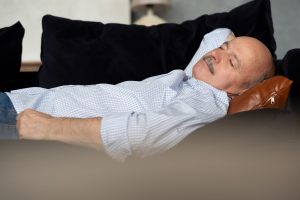
Napping is a harmless — and perhaps even helpful — practice for most people. Whether you are struggling to get through an afternoon slump or just need to take a midday siesta, getting a little shuteye can have significant benefits. However, that might not be the case if you have sleep apnea. Napping and sleep apnea have a negative relationship. Let’s discuss why that is so and what you can do to improve the quality of your nighttime rest.
Napping and Sleep Apnea
There are a couple of ways in which napping can adversely affect individuals with obstructive sleep apnea (OSA):
- If you just plan on taking a short nap, you may reason that you do not need to use your CPAP machine or oral sleep appliance. As a result, you might experience several pauses in breathing during your nap. You may even wake up feeling worse than when you laid down.
- Napping can make it more difficult to fall asleep at night — the time when you are more likely to use your OSA treatment. If you are not yet accustomed to your OSA therapy, tossing and turning with it for long hours before you fall asleep can be quite uncomfortable.
Improving the Quality of Your Nighttime Sleep
It’s generally best for OSA patients to skip naps. However, if you do choose to nap, try not to sleep for more than 20 – 30 minutes. This will prevent you from entering the deep phases of sleep and is less likely to interfere with your nighttime sleep routine. You should also be diligent about complying with your OSA therapy every time you sleep.
Here are some additional tips to help you get higher-quality rest at night:
- Consult with a sleep apnea expert if you have questions or concerns about your OSA therapy. For example, if you are currently using a CPAP machine and you find it uncomfortable, you may find it beneficial to switch to a custom oral appliance. Oral appliances are more comfortable and convenient than CPAP.
- Keep an eye on your OSA symptoms and report any significant changes to your OSA therapy provider.
- Stop using electronic devices at least an hour or two before bed.
- Do not drink caffeinated beverages in the afternoon.
- Do not drink alcohol within the last few hours before bedtime.
- Adjust your thermostat so your bedroom temperature is slightly on the cool side. Make any other necessary adjustments to the comfort of your bedroom.
- Try to go to bed around the same time each night so your body can settle into a routine.
Napping can be beneficial — but it’s not always a good idea for individuals with OSA. Skipping your daytime snooze can help you sleep better at night!
About the Author
Dr. Pamela West is an experienced dentist who is trained to help patients conquer sleep apnea via oral appliance therapy. If you have questions about OSA or how you can improve the quality of your nighttime rest, she would be pleased to talk with you. Contact our practice at 702-844-6226.
